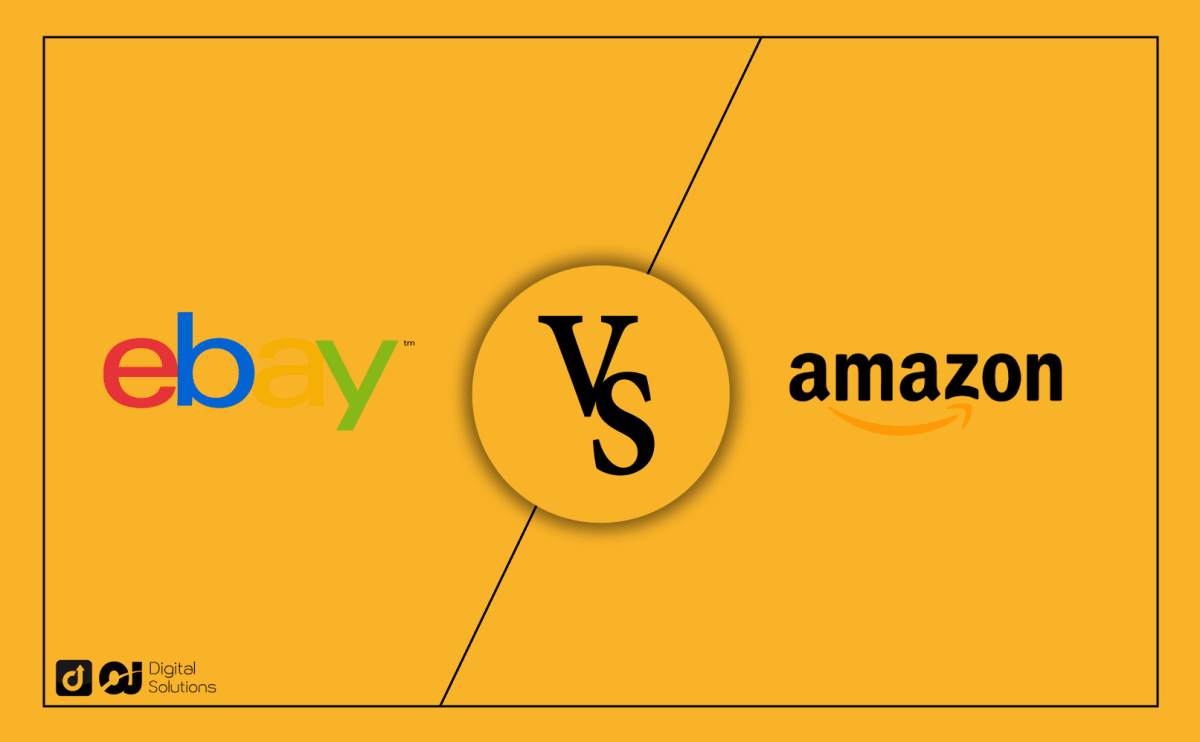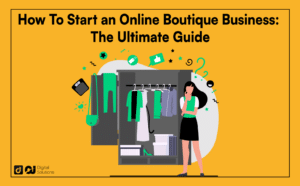eBay vs. Amazon: Which is better for my ecommerce business?
You’ve come to the right place for answers.
Both eBay and Amazon have advantages and disadvantages for professional sellers like you.
I wrote this comparison guide to discuss each platform’s features, advantages, and disadvantages to help you decide which is better for your selling needs and goals.
Let’s begin.
eBay vs. Amazon: What’s the Difference Between eBay and Amazon?
Here are the differences between each platform at a glance.
| eBay | Amazon | |
| Customer Base | 180 million active monthly online shoppers worldwide | 310 million active monthly online shoppers worldwide |
| Seller Base | Over 18 million active eBay sellers worldwide | Over 9.5 million active Amazon sellers worldwide |
| Listing Type | Fixed-price and auction-style listings | Fixed-price listings |
| Market Share | 3.5% retail ecommerce market share | 37.5% retail ecommerce market share |
| Seller Tools | Creating, maintaining, and promoting listings | Listing optimization, store promotion, analytics, etc. |
| Fee Structure | Basic – $27.95 (monthly renewal) Premium – $74.95 (monthly renewal) Anchor – $349.95 (monthly renewal) Enterprise – $2,999.95 (annual renewal) | Individual Seller – $.99 per sold item (less than 40 units monthly) Professional Seller – $39.99 monthly (over 40 units monthly) |
I’ll discuss the differences in selling on Amazon vs. selling on eBay to help you decide which is better for your ecommerce business.
Seller Fees
Amazon Selling Fees
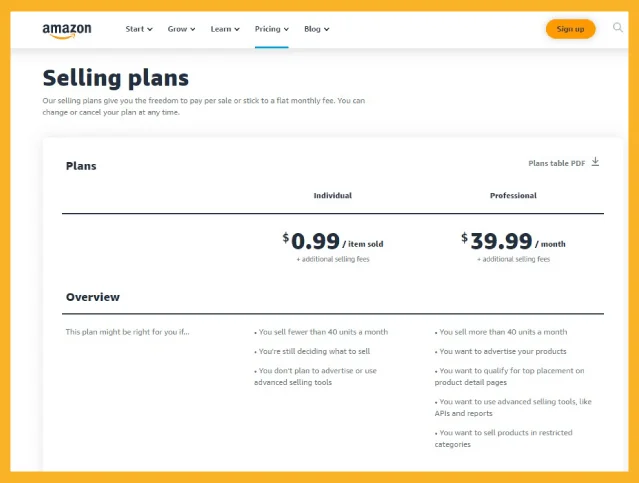
There are two selling plans on Amazon: Individual Seller and Professional Seller.
Your choice depends on how many units you sell monthly. Choose the Individual Seller plan if you sell less than 40 units monthly. This plan is cheaper because you don’t pay a monthly fee.
You pay only 99 cents for every item you sell.
Choose the Professional Seller plan if you sell over 40 units monthly. This plan costs $39.99 monthly.
The Individual Seller plan is great if you’re an ecommerce beginner unsure how many items you’ll sell monthly.
The Professional Seller plan is best if you anticipate selling more than 40 items monthly since it lets you sell unlimited units monthly.
Besides the fees you pay for your selling plan, you also pay referral fees for each item you sell.
Referral fees can be between 8% and 15% of the total cost according to the product type.
You must also pay other fees to join Amazon’s Fulfillment by Amazon (FBA) program.
eBay Selling Fees
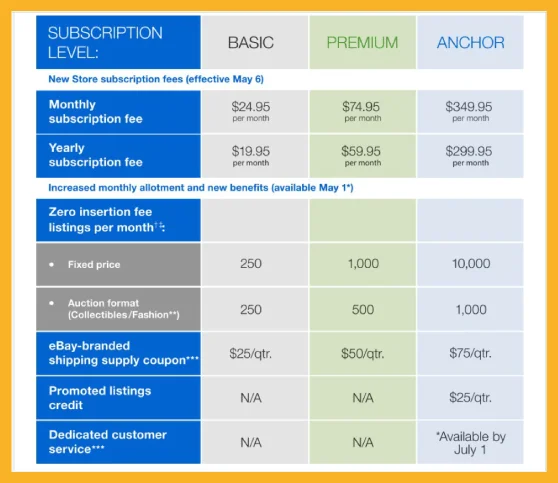
There are two types of selling fees on eBay.
- You pay insertion fees when listing products.
- You pay final value fees after selling products.
eBay charges a $0.35 insertion fee for each listing and category; you have a monthly listing allowance after creating your eBay store.
eBay calculates final value fees as a portion of the product’s purchase price, including handling and shipping charges.
The amount you pay on eBay fees will vary depending on your eBay account type.
You cannot get the return fees if your product fails to sell. You must also pay another insertion fee each time you relist your product in your online store.
Selling on eBay also includes payment processing fees like the PayPal processing fee.
Fulfillment Methods
Amazon Fulfillment Options
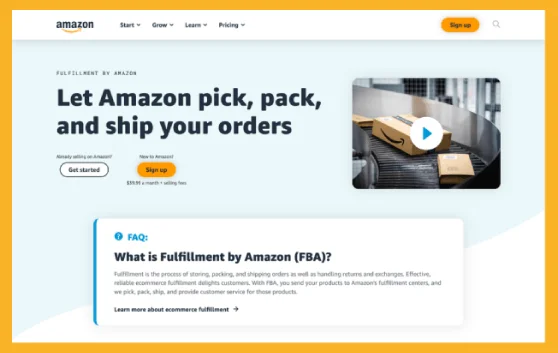
Unlike eBay, Amazon has a well-developed fulfillment system.
If you sell on Amazon, you can either pack and ship orders yourself on Fulfillment by Merchant (FBM) or outsource the effort to the company through Fulfillment by Amazon (FBA).
Amazon FBA vs. FBM: Which one is better?
With FBA, Amazon handles the sorting, packing, shipping, returns, refunds, and customer service for you.
It’s not free, but it’s highly beneficial for Amazon sellers like you who can’t or don’t want to rent a warehouse or ship products independently.
Fulfillment on eBay
In 2019, eBay attempted to launch Managed Delivery, an in-house fulfillment service, but discontinued the project in 2022.
You have two fulfillment options when selling on eBay:
- Pack and ship your orders yourself.
- Enlist the aid of third-party sellers or fulfillment options.
Paid Advertising
Paid Advertising on Amazon
You can reach the top of search results using Amazon Sponsored Products, where you pay every time your customers click on an advertisement link in this pay-per-click (PPC) program.
Amazon Sponsored Products is a cutting-edge service with many applications and additional tools to help you manage your marketing campaigns.
However, keeping track of your advertising budget is essential to ensure you still have a good profit margin.
Paid Advertising on eBay
eBay provides Promoted Listings, which increase your products’ visibility in search results.
eBay promotes your product alongside other sellers’ products after bidding a sum you must pay in addition to your final value fee, typically between 5 and 10%.
You only need to pay for eBay Promoted Listings whenever a product sells; the best thing is that they are straightforward.
Even though the program isn’t particularly complex, it gets people’s attention and boosts sales.
Getting Paid
Getting Paid On Amazon
Amazon deposits your earnings into your Amazon Pay account and automatically disburses the funds into your bank account on the next scheduled settlement date.
Getting Paid On eBay
As an eBay seller, you receive your earnings via the checking account you linked to your eBay merchant account.
eBay automatically deducts transaction fees, selling fees, and other costs from your payouts.
If you schedule daily payouts, it takes eBay two days after confirming the buyer’s payment to initiate your payouts.
If you schedule weekly payments, eBay initiates payouts every Tuesday for the sales you made from Monday to Sunday of the previous week.
The Pros and Cons of Selling on Amazon
Here are the pros and cons of selling on Amazon.
| Pros | Cons |
| Lower selling fees | Many restricted categories |
| Reputation | Additional FBA fees |
| Branding opportunities | Difficulty in listing products |
| Fulfillment services (Amazon FBA) | High level of competition |
Pros
- Lower selling fees
Amazon’s fees are lower than eBay’s. Amazon charges a flat fee of $0.99 per item plus a referral fee (a percentage of the total sale fixed price). Referral fees on Amazon also tend to be lower than the final value fees on eBay.
- Reputation
Amazon has built much trust with buyers over the years because of its amazing customer service, return policy, and buyer protection.
- More branding opportunities
Amazon offers more branding opportunities for sellers than eBay. You can create a Storefront, a mini-website showcasing your products on Amazon. You can also create coupon codes and discounts to help promote your own brand and products.
- Fulfillment services
The Fulfilled by Amazon (FBA) program lets you store your products in Amazon’s warehouses, and they will handle the shipping and customer service for you.
Cons
- Many restricted categories
There are more restricted categories on Amazon than there are on eBay. As an Amazon seller, you will have less freedom to list the products you want to sell.
- Extra FBA fees
You must pay extra Amazon fees if you use Amazon’s fulfillment services. These FBA fees can add up quickly if you sell many products.
- Difficulty in listing products
It is more difficult to list products on Amazon than on eBay because Amazon has more rules and guidelines that you need to follow. It also means getting your products listed on Amazon will take longer.
- More competition
Amazon is popular worldwide, meaning millions of sellers are vying for customers’ attention.
The Pros and Cons of Selling on eBay
Pros
| Pros | Cons |
|---|---|
| Less seller competition | Smaller user base |
| Customer loyalty | Less reputable than Amazon |
| Fewer category restrictions | No fulfillment program |
| Hassle-free listings | High selling fees |
- Less seller competition
eBay has almost double the sellers Amazon has. However, there’s less competition on eBay because the platform allows you to sell a wider variety of goods, giving you more opportunities to stand out.
- Customer loyalty
There is a lot of customer loyalty on eBay. eBay shoppers tend to be loyal to the sellers they buy from on eBay and are less likely to switch to other platforms or sellers.
- Fewer category restrictions
eBay has fewer category restrictions than Amazon, meaning you have more freedom to offer products you want to sell.
- Easier to list products
Listing products on eBay is easier than on Amazon because eBay does not have as many rules and guidelines that you need to follow.
Cons
- Smaller user base
eBay has only a 3.5% market share, meaning its audience is much smaller than Amazon, which has a 37.5% market share. You have a smaller pool of potential buyers to sell to on eBay.
- Less reputable than Amazon
eBay has less buyer trust than Amazon, and many eBay customers mistrust sellers and may prefer Amazon.
- No fulfillment program
eBay does not have a fulfillment program. If you use eBay to sell products, you will be responsible for storage, shipping fees, and customer service.
- Higher selling fees
eBay charges higher fees than Amazon.
Do Consumers Trust Amazon or eBay?
Although consumers trust both Amazon and eBay, Amazon is generally trusted more because the company has built a reputation for putting the customer first.
Amazon also offers more buyer protection than eBay. Amazon has an A-to-Z guarantee that protects buyers from scams, while eBay only offers a Money-Back Guarantee covering certain transaction types.
Frequently Asked Questions (FAQs)
Is It Riskier To Sell on Ecommerce Sites?
The risks of selling on eCommerce sites depend on the platform you use.
For example, Amazon has an A-to-Z guarantee that protects buyers from scams, while eBay only offers a Money-Back Guarantee covering certain transaction types.
So, if you are looking for a platform with low fees and good buyer protection, then Amazon is the better choice.
However, if you are looking for a more diverse company available in more countries, then eBay is the better choice.
Can I Make a Living by Selling on Ecommerce Sites?
Yes, you can make a living off of selling on eCommerce sites. Many people do just that.
However, it is important to remember the risks associated with selling on eCommerce sites. For example, the fees associated with selling on Amazon and eBay can eat into your profits.
Additionally, scammers may try to take advantage of you if you are not careful. So, while making a living off selling on eCommerce sites is possible, you must be aware of the risks involved.
Is Amazon Bigger Than eBay?
Yes, Amazon is bigger than eBay. Amazon had 469.8 billion USD in 2021, while eBay only
had a revenue of 10.42 billion dollars during the same period.
Additionally, Amazon is a more diverse company than eBay.
In addition to being an online marketplace, Amazon also offers cloud computing services, digital streaming services, and its line of consumer electronics.
eBay, on the other hand, is primarily an online marketplace.
What Are Popular Alternatives to Amazon and eBay?
There are many popular alternatives to Amazon and eBay. Some popular options include Etsy, Overstock, Bonanza, eBid, and eCrater.
Each of these platforms has unique features and benefits. Do your research to find the platform that best fits your needs.
Is Amazon Better Than eBay? Amazon vs. eBay Comparison
Both Amazon and eBay are reliable platforms. However, Amazon is more reliable because it has more safeguards than eBay.
Although eBay also has safeguards, the platform isn’t as secure as Amazon.
Amazon also has the FBA program that can help you succeed as a seller. With FBA, you can ensure your Amazon customers receive their orders on time.
The Bottom Line
I hope my eBay vs. Amazon comparison guide makes it easier for you to decide which marketplace is better for your online store.
Remember, eBay isn’t necessarily better than Amazon, and vice versa. Your choice of eBay or Amazon depends on your product, target audience, budget, and selling goals.
If you decide to sell on Amazon, you must learn how to become an Amazon seller.
Meanwhile, if you decide to sell on eBay, I recommend learning the best things to sell on eBay

